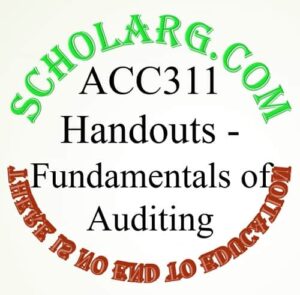ACC311 Handouts cover the Fundamentals of Auditing syllabus. Auditing is a critical aspect of financial management and corporate governance, ensuring an organization’s financial statements are accurate and reliable. This blog explores the fundamentals of auditing, focusing on its importance, principles, and processes.

Students will be able to understand the basic concepts and goals of auditing, general principles governing, reasonable assurance, legal considerations regarding the rights and obligations of the auditor, the significance of books of account and financial statements for auditing, the necessity of understanding the entity and its environment, etc., through Fundamentals of Auditing. Additionally, students will learn about various audit tests and approaches that are used to test and verify assets, equity, liabilities, sales, inventories, cash, and bank balances, among other things. The significance of statistical sampling methods for financial statement planning and auditing will also be covered with the students.
ACC311 Handouts – Fundamentals of Auditing Course Learning Outcomes
Students who complete the program will be able to:
- Understand the nature, purpose, organization, and significance of an audit for stakeholders.
- Describe how standards and laws play a part in the preparation and conduct of an audit.
- Recognize the significance of comprehending the entity and its surroundings for the audit plan and developing an opinion.
- Use the methods provided for evaluating internal controls to find any weak points.
- Describe the variety of auditing techniques that auditors can use to provide audit evidence.
- Determine the guidelines for examining and confirming the information in a client’s financial statements.
- Understand the purpose of sampling and its requirements for an audit program.
- Apply auditing standards and practices to a variety of entities, such as publicly listed firms, small enterprises, and non-profit organizations, among others.
- Convey audit results in written reports and oral presentations.
Importance of Auditing
Assurance and Credibility
Auditing provides assurance to stakeholders, including investors, creditors, and regulatory bodies, that the financial statements of an organization are accurate and free from material misstatements. This enhances the credibility and reliability of financial information, which is crucial for decision-making.
Detection and Prevention of Fraud
An effective audit process helps in the detection and prevention of fraud and errors. By examining financial records and internal controls, auditors can identify any irregularities or weaknesses that could lead to fraudulent activities, thereby safeguarding the organization’s assets.
Compliance with Regulations
Audits ensure that organizations comply with relevant laws, regulations, and accounting standards. This compliance is essential to avoid legal penalties and to maintain the trust of stakeholders. Regular audits help organizations stay updated with changing regulations and implement necessary adjustments in their financial practices.
Principles of Auditing
Integrity and Objectivity
Auditors must maintain integrity and objectivity throughout the audit process. They should conduct their work with honesty and without bias, ensuring that their findings are based solely on the evidence obtained. This principle is fundamental to establishing the credibility of the audit.
Professional Competence and Due Care
Auditors should possess the necessary skills, knowledge, and experience to perform their duties effectively. They must exercise due care, diligence, and thoroughness in their work to ensure that their audit findings are accurate and reliable.
Confidentiality
Auditors are entrusted with sensitive financial information, and it is imperative that they maintain confidentiality. They should not disclose any information obtained during the audit to unauthorized parties, and they should handle all data with the utmost care and discretion.
Auditing Process
Planning the Audit
The audit process begins with thorough planning. Auditors gather information about the organization, its industry, and its financial practices to understand the scope of the audit. They identify key areas of risk, set materiality levels, and develop an audit plan outlining the procedures to be followed.
Conducting Fieldwork
During the fieldwork phase, auditors collect and analyse evidence to support their findings. This involves examining financial records, testing internal controls, and verifying transactions. Auditors use various techniques, such as sampling, observation, and interviews, to gather sufficient and appropriate evidence.
Reporting and Follow-Up
After completing the fieldwork, auditors compile their findings into an audit report. This report includes an opinion on the accuracy of the financial statements and highlights any significant issues identified during the audit. Auditors also provide recommendations for improving internal controls and financial practices. Follow-up audits may be conducted to ensure that the organization has addressed the identified issues.
Conclusion
Auditing plays a vital role in maintaining the integrity and transparency of financial information. By understanding the importance, principles, and processes of auditing, organizations can enhance their financial reporting, prevent fraud, and ensure compliance with regulations. Whether you are a financial professional, a business owner, or a stakeholder, a solid grasp of auditing fundamentals is essential for informed decision-making and effective corporate governance.
ACC311 handouts are available on the link ACC311 Handouts
Other Useful links include: BNK603 Handouts – Consumer Banking